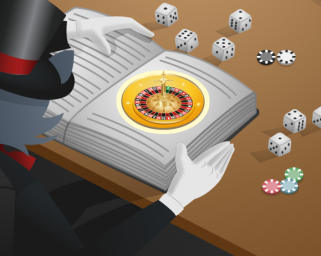Poker is one of the world’s most popular table games. It’s known for being a game involving great skill and strategy, as much as luck. The rules are simple. Winners are determined based on the outcome of each player’s combination of cards, and bets are made accordingly before hands are revealed. Though there are hundreds of versions of poker, the main objective remains the same: to have the best hand or to make the opposing player(s) believe that you have the best hand.
Poker might seem like an intimidating game for beginners, but fortunately, there are many things that you can do to increase your chances of winning as a novice. Every good player knows that poker is about learning to effectively use a combination of chance, strategy, and timing. This becomes more apparent once you’ve learned exactly how to play poker, and overtime, anyone can learn the proper techniques and tricks.
We’ve put together this guide on how to make a killer impression at the poker table, whether you’re playing at a brick-and-mortar casino, or right here at CoolCat. Take a seat at the table with us, and you’ll leave with a big stack of cash!
Poker Tips and Tricks
1. Body Language

Body language is crucial when playing poker. We have all heard of the terms regarding body language in poker such as a poker face and bluffing, but there are many other methods that one must utilize and internalize to gain an advantage.
Everything from your posture to how you carry yourself to the way you’re angling your body. Often, simply being aware of your body language can result in immediate improvements. You can practice body language awareness by playing online in front of a mirror.
Be aware of subtle cues such as where you point your feet, the position of your shoulders, or the way you sit at the table to avoid revealing tells. Outward expressions of body language are messages or social cues that opponents can use to their advantage, so be mindful of them.
2. Start Low
Another poker tip that many players find useful is to start by betting low. Keep in mind that your goal is to learn poker strategy and not waste money while doing so. When you are not risking huge sums of money, you are more comfortable with losing and won’t let that affect your concentration and mentality.
his will enable you to learn from the game in front of you and help you to become more confident as you play. Starting at the lowest limits lets you spot the weaker players and puts you in a better position above them mentally. It’s a great exercise in bankroll management.
3. Know When to Bet and Fold

Ultimately, the game of poker boils down to mathematics. There are certain outcomes and sets of hands that are less likely than others. Study the various types of hands and memorize in detail the odds of particular card combinations over others. This way when you play you can recognize moments when you can expect to be dealt a straight flush vs. a pair of face cards.
No poker player can bet intelligently unless they know what constitutes a good hand, a fair hand, and a bad hand. Take opportunities when they present themselves, and recognize when you have a bad hand and fold. Don’t let your ego get the better of you — this will help you when you play for real money.
4. Timing
Bluffing is an exciting and important part of poker, so learning the right time to make this move can really propel your poker game. A rookie mistake and classic mark of a beginner is bluffing too often. Good players can recognize this and will catch you, quickly outing you as a fresh fish, and ruining your bank balance.
Don’t be careless or play too risky. Timing is critical. Play good hands when you have them, but be careful not to seem overly confident when you don’t. Experience is the best way to learn when to double-down, go all-in, or fold. It’s also important to learn the pace of the game. There is nothing that players hate more than someone who plays out of turn, fidgets, or bets prematurely. You should only make any sort of card movement, bets, or folds when it is your turn. But don’t worry, this comes with practice. You’ll get the hang of it soon!
5. Know Your Opponent

Poker is a lot about social dynamics and understanding people. As with any type of social interaction, you will encounter different types of people with every game you play. A key advantage is to recognize that there are different types of players and that each player requires a different approach. Ultimately, your goal is to convince the other player whether you are holding a certain hand or not.
Not all aggressive players are good, and not all passive players are easy to beat. Some players learn how to project an image and otherwise do the same to win. So be prepared for all possible scenarios. The sooner you spot the type of player you are playing against, the sooner you can work that to your advantage.
Just remember this: think about your opponents’ cards. Understanding the range of your opponent will help inform you on the many outs you have and when to capitalize on educated decisions. Though there are many factors that will suggest what hands your opponent could be playing, the simplest version is to recognize his/her position at the table.
How they bet or check will reveal their strengths and weaknesses, and it’s good to know that people are less likely to have many strong hands in a row when you consider what you have. Also, the more time they take making a decision lets you know whether they have a good hand or are bluffing. Knowing the difference will help you in a big way!
6. Practice
As with any skill, the more experience gained by practicing, the more you benefit and become better. Learn by playing poker at a table and around people, or practice by playing online. The more you learn about the psychology, strategy, and social dynamics involved in the game, the better you will become. When your skills improve, your bankroll expands. Once you play at a table for real money, there is no better confidence booster than knowing exactly what you’re doing.
Poker Myths
There is a lot of information out there about poker and how to win, but a lot of the information is false. In this section, we break down some of the top poker myths and misconceptions. Study this information and use it to your advantage next time you sit down at the table.
1. Poker Is Just a Game of Luck

As with any other casino game, luck does have something to do with poker, but it is certainly not the driving most force behind successful poker players.
Poker is all about making the best hand with the cards in the deck that come into play. While a player has no guarantee of receiving the strongest cards, the game can be influenced substantially by making the correct decisions. A good poker player will calculate odds, bet strategically, and do everything in his or her power to obtain the highest hand possible in each round. This is easily supported by watching a seasoned pro play against a beginner. The seasoned pro will win almost every hand. While luck is involved with what cards you are dealt, skill and strategy influence the game much more heavily.
2. The Best Poker Players Constantly Bluff
Although it is true that bluffing can help a poker player win a hand in which they are at a disadvantage, “serial bluffing” is dangerous and becomes predictable to your opponents. Sooner or later players will not take any move seriously and the bluffs will backfire. Be wise with your bluffs. Bluffing at the wrong time can be a very costly mistake. Not only will make you lose a hand and some cash, but people can begin to “read” you, meaning you will lose all your “bluffing privileges” forever.
3. Aggressive Players Have Better Chances of Winning

If we had a dime for every time we’ve heard that the more aggressive you are, the better your chances of winning are… we’d be millionaires. But this is simply not true. This may be true in Hollywood films, but not in reality.
In fact, playing too aggressively can be very, very costly. Your elevated emotions will cloud your judgment and result in poor decision-making. If you are going to play aggressively, do not do it every hand or very often. Do it when you know you have the cards and chips to back it up.
4. Great Poker Players Are Born, Not Made
While some people might show some natural ability to play poker or to strategize, you can certainly be taught how to elevate your skill level and become a professional. As with anything, it takes lots of time and dedication. For professional poker players, poker is not a game: it’s their profession. They dedicate hours every single day to perfecting their skill.
They learned, they studied, they practiced, they failed, they got back up. After every failure, they got right back on their horse and learned from their mistakes. They are constantly trying to find ways to be better. It is not possible to be born a poker professional — everyone must practice and learn the tools of the trade.
Recap
Useful tips for poker players
- Set an intention and have an objective in mind even before you sit at the table.
- Play when you feel good. This will guarantee confidence and will remove the possibility of losing your cool at the table.
- Body language: be mindful of your movements at the table. Other players will try to spot signs and use them to their advantage.
- Start low and play tight but aggressive. It helps to start by betting low, build confidence as you play, and bet big when it counts.
- Know the odds and when to bet or fold. Study the odds of being dealt various hands and don’t let your ego get the better of you.
- Timing is everything. There are critical moments knowing when to bluff but don’t overdo it.
- Know your opponent and get a feel for their potential hands and style of play. The more you study them the better understanding you have of knowing what you’re up against.
- Practice. Practice. Practice. The more you practice online and with friends the better you will be when it comes down to sitting at a real table.
Get in the game

Poker is a tough game that boils down to skill, patience, and perseverance, but it is not an enigma. Much like life, it is about understanding people and how to influence decision-making.
Incorporating these elements along with understanding the mathematics involved will help you improve as a player during the dynamics of gameplay. Keep the listed tips in mind, and you’ll be sure to make a killer impression at the poker table in no time!
Now that you’re feeling more comfortable, and have some important unspoken poker rules in your back pocket, you should register with CoolCat Casino today to try your hand and play for real money!










